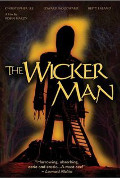
Directed by
Robin Hardy
86 minutes
Rated MA
Reviewed by
Bernard Hemingway

The Wicker Man
The Wicker Man is one of the more bizarre offerings from the British film industry of the early 1970s, reflecting the Zeitgeist enthusiasm for non-conformism and social experimentation, albeit realized in a very British manner. Although the film has achieved cult status and deserves a viewing for at least for novelty value, why it has been comprehensively showered with critical plaudits is far from clear.
British Lion Film Corporation who made the film decided that it was a box-office dud, trimmed 12 minutes from the original 100-minute version and released it as part of a double bill with Nicholas Roeg's vastly superior Don't Look Now probably would have quietly sunk from sight but it star Chistopher Lee, with the assistance of Roger Corman, who ended up with the only complete copy of the film after the master negative was destroyed championed the film to its present day status which includes a presence (admittedly in the lower reaches) in the BFI's list of 100 Best British Films.
Edward Woodward plays Sgt. Neil Howie, a provincial police officer who arrives at a remote Scottish island community to investigate the alleged disappearance a young girl. No-one admits to knowing the girl, even her mother. Howie can see something is awry but when that night he encounters couples copulating on the village green he starts to realize that he is amidst some kind of atavistic pagan cult and his proper Christian morals are scandalized. Then the publican’s daughter (Britt Ekland) tries to lure him into playing the two-backed beast and the locals admit that the missing girl is buried in the church yard. Howie goes to the squire, Lord Sommerisle (Lee), to get the body exhumed. But there’s no body, only a dead hare. WTF!
WTF indeed. Fans of Hammer horror and similar low budget fare will enjoy this film – audiences with more exacting standards of realism or a taste for strong production values will struggle with the relatively cavalier realization, Edward Woodward’s solid efforts in the lead role notwithstanding.
Scripted by Anthony Shaffer, best known for Sleuth, there are certainly some good ideas here as the story taps into the Anglo-Celtic roots of British society and contrasts it with English Puritanism. But if the gear-crunching tonal changes (somewhat recalling, at least in sensibility, Peter Medaks’ The Ruling Class released the same year) that includes Celtic-style musical numbers are incongruous, much of the film suffers from a persistent sense of the makeshift and expedient. Whilst the plot’s resolution is clever and the staging of final scene which gives meaning to the title is truly impressive overall this is a film in which the idea is more compelling than the actuall realization.
FYI: The film was remade in 2006 by Neil LaBute with Nicolas Cage in the lead and transposed to an island in Puget Sound. The basic story remained the same but the joyous pagan cavorting was replaced by a cartoonishly castrative cabal of female separatists whilst the resort to usual thriller conventions (Cage pointing a gun at one of the women and yelling “Step away from the bike” is one of the film's more bathetic moments) only helped to undermine whatever charms there were in the original.
Want something different?





